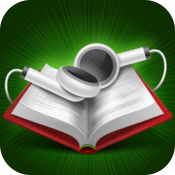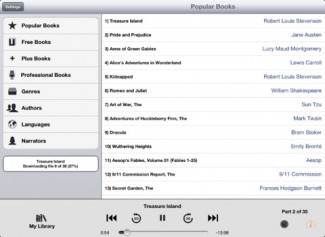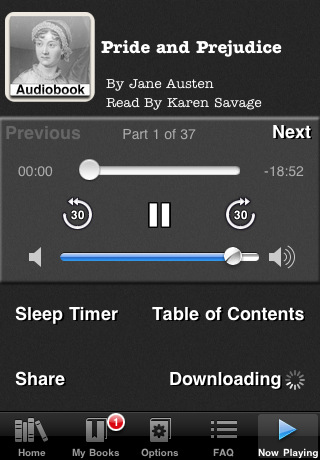Sue’s Focus Travels
LQ: 7.95
Recommended Age: 4+
Skills Used: Focus, Time Management, Mathematics, Writing

The AudioBooks apps is a modern-day option for “books on tape” that allows users to access a great collection of free audio books, as well as a selection of premium books that can be downloaded for a set price. AudioBooks can be a great aid in helping alternative learners overcome distracted reading, and they also serve as a helful guide for understanding academic concepts like characterization, plot lines and phonetics. By listening to an audio book while reading along with a text version, users can more easily learn how to properly sound out difficult language, while honing their ability to focus on vocabulary and context to increase comprehension. While AudioBooks should not replace traditionally reading practice altogether, it can be a great assistive technology for struggling alternative learners. Due to the simple and straightforward nature of the app, AudioBooks is recommended to ages 6 and up.
Getting started and then maintaining attention and effort to tasks. Ignoring external distractions.
 Using an audio book can make it easier to fully comprehend and focus on a text, allowing users to more easily follow along with the narration and retain information. Audio books may seem like an easy option, but if used correctly, listeners will be working just as hard as regular readers. An auditory version of a book can be used to supplement regular reading, allowing users to concentrate on the correct pronunciations of words, focus on their context and better grasp the overarching narrative of the material. Tackling a lengthy book can be a daunting task, but having an audio version to supplement reading makes it easier to maintain the kind of effort and interest needed to see tougher texts through to the end.
Using an audio book can make it easier to fully comprehend and focus on a text, allowing users to more easily follow along with the narration and retain information. Audio books may seem like an easy option, but if used correctly, listeners will be working just as hard as regular readers. An auditory version of a book can be used to supplement regular reading, allowing users to concentrate on the correct pronunciations of words, focus on their context and better grasp the overarching narrative of the material. Tackling a lengthy book can be a daunting task, but having an audio version to supplement reading makes it easier to maintain the kind of effort and interest needed to see tougher texts through to the end.
Being efficient and aware of our use of time and effort.
AudioBooks can help reduce the time it takes to complete lengthy reading assignments, serving as a time-saving supplement to text-based reading. Listening along while reading text can speed up the ability to understand difficult words, quickly expand vocabulary and better contextualize difficult reading (a great example is Shakespeare, where listening to the dialogue helps better bring the tale to life). Slow readers who usually take extended amounts of time to complete reading will see the once-daunting task made more manageable with the help of an auditory aid. Listening to an audio book can offer the opportunity to catch up on assignments when traditional reading isn't an option, too. Users can carry hundreds of books at once, giving them access to class assignments at a moment's notice and allowing them to squeeze in time for books whenever the chance arises.
The AudioBooks app serves as an excellent assistive technology when it comes to individual reading. Having both the text and audio version of the same book available for comparison can help readers better grasp the tone of dialogue, temperament of characters, expand vocabulary, improve spelling and more fully understand a book's over-arching plot. Think of it a the handy equivalent of having a teacher read aloud, while students read along with the text. Users will hear fluid reading pronounced correctly, following along with the text to help reinforce comprehension and pronunciation.
In order to get the most out of AudioBooks, try some of our suggestions below, or let us know what worked best for you in the comment box at the bottom of the page.
 Set some goals for each night, having your child read along with at least one chapter of a book a night. Have your child keep a pen and paper handy to write out any unfamiliar words she encounters, noting whether she was puzzled by the spelling, pronunciation, or definition. The following day, ask your child to recap what happened in the book to ensure she maintained attention throughout the reading and fully grasped the story. Next, go over her notes with her, ensuring she gains an understanding of what puzzled her in the first place. When reading along with an audio book, it can be tempting to space out, so encourage your child to concentrate throughout and take notes to discuss with you later. Make sure to note the importance of remaining focused, and how doing so helps to achieve a more full and comprehensive comprehension of the text.
Set some goals for each night, having your child read along with at least one chapter of a book a night. Have your child keep a pen and paper handy to write out any unfamiliar words she encounters, noting whether she was puzzled by the spelling, pronunciation, or definition. The following day, ask your child to recap what happened in the book to ensure she maintained attention throughout the reading and fully grasped the story. Next, go over her notes with her, ensuring she gains an understanding of what puzzled her in the first place. When reading along with an audio book, it can be tempting to space out, so encourage your child to concentrate throughout and take notes to discuss with you later. Make sure to note the importance of remaining focused, and how doing so helps to achieve a more full and comprehensive comprehension of the text.
If your child is a slow reader and struggles to keep up with a classroom reading regiment, purchase both an audio and text version of the required book. Have your child listen and follow along with the text in a scheduled nightly reading routine. Reading will likely go much quicker, so make sure to check for comprehension along the way to ensure your child fully understand the reading material.
Note all the times in your child's day that can be used to catch up on reading by listening to an audio book. Work with your child to make a list of times when she can pop out her MP3 player for intermittent bursts of reading. Identify blocks of time that can be spent listening along to her reading, like when enduring a long a car ride, waiting for the school bus when waking up early. Listening to a book offers up many opportunities to quietly enjoy some reading without disturbing those around you.
Audiobooks can make it easier to read aloud together. Select an audio book that you and your child will read together, and also locate a text copy. Play the audio book and read along together, while gliding your finger under the words as they are read. Pause the audio periodically and discuss what has happened in the story, the kinds of vocabulary used and the motives of the characters.
You can even encourage your child to record her own audio book (this can easily be done using the "Voice Memo" function on any iDevice). Have her select her favorite story, and read it in its entirety, out loud from beginning to end, including fun voices for each character and sound effects to bring the story to life. By practicing sounding out the words and voices herself, she can practice pronunciation while honing her reading fluency.
 Children with ADHD are often easily distracted by outside stimuli, and sometimes have an aversion for tasks that require prolonged mental effort, like reading and writing. When using Audiobooks, children with ADHD will maintain a more concentrated focus while engaging with a text. Many children find it helpful to play an audiobook, while simultaneously following along with a printed copy. Children with ADHD tend to be passive readers, retaining little from what they read, so Audiobooks can help to create active readers, who are able to stay attentive and absorbed in a piece of literature.
Children with ADHD are often easily distracted by outside stimuli, and sometimes have an aversion for tasks that require prolonged mental effort, like reading and writing. When using Audiobooks, children with ADHD will maintain a more concentrated focus while engaging with a text. Many children find it helpful to play an audiobook, while simultaneously following along with a printed copy. Children with ADHD tend to be passive readers, retaining little from what they read, so Audiobooks can help to create active readers, who are able to stay attentive and absorbed in a piece of literature.
How to Use Audiobooks for Kids with ADHD:
The Audiobooks app is just one option for assistive technologies in reading. Explore the tools below, and let us know which resource you enjoy in the comment box at the bottom of the page.
Audible is run by Amazon, and offers an alternative to way to search and download audio books, and play them from your computer or mobile device. Find out more here.
 Children's Audio Books Volume 1:
Children's Audio Books Volume 1:
This app offers a variety of classic children's books in audio format. Users can also use a virtual bookmark, and download content so that it is available even offline. Find out more here.
This app offers a growing library of free audio books that can be accessed from any Apple device. Users can organize and manage their inventory quickly and easily. Find out more here.
All membership plans come with full access to our entire suite of tools learning guides, and resources. Here are a few of the ones we think you’ll like the most: